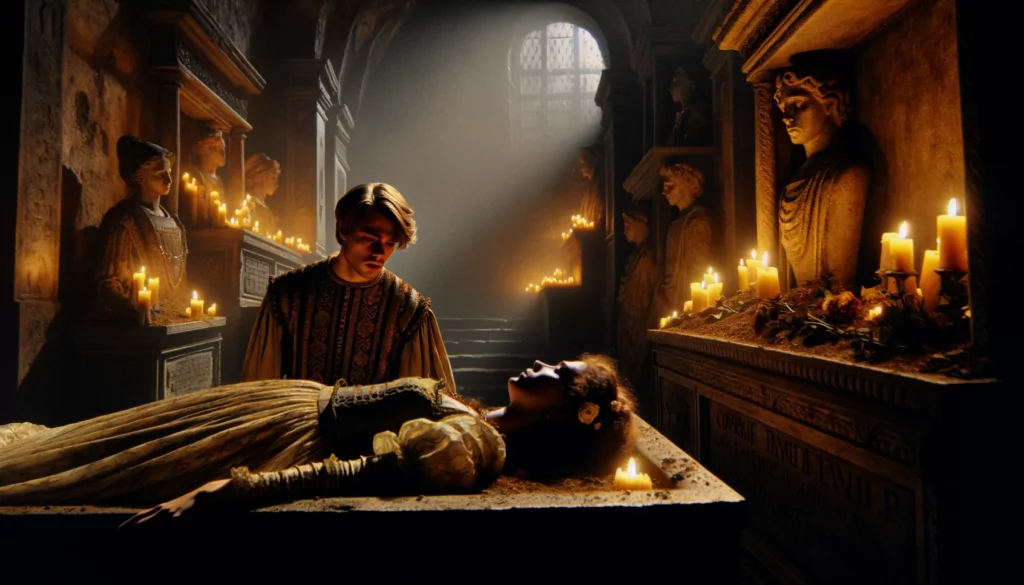The following sample is meant to be a source of inspiration for students in their academic pursuits.

✅ AI Essay Writer ✅ AI Detector ✅ Plagchecker ✅ Paraphraser
✅ Summarizer ✅ Citation Generator
In the world of literature, the death of a character often sends shockwaves through a story, leaving a mark on both the narrative and its audience. Shakespeare’s “Romeo and Juliet” is a prime example, where each character’s demise isn’t just a plot point but a profound statement. From Mercutio’s haunting final words to how did Romeo and Juliet die – a tragic culmination involving poison and overwhelming despair – these deaths transcend mere tragedy. They echo the deeper themes of Shakespeare’s play: the destructive nature of feuds, as emphasized by the prince, the folly of youthful passion, and the heartbreaking consequences of miscommunication. Such moments remind us that in literature, death is more than an end—it’s a powerful force that shapes the story’s very soul.
Short Plot of Romeo and Juliet
By now most people are familiar with what happened in Romeo and Juliet in one way or another. “Romeo and Juliet,” Shakespeare’s famous play, takes place in the city of Verona. This city is pretty much controlled by two families who despise each other – the Capulets and the Montagues. The main story revolves around Romeo, who’s a Montague, and Juliet, a Capulet. They fall in love, but their romance is doomed from the start due to their families’ rivalry. Their relationship is a rollercoaster of intense feelings, from being totally in love to dealing with the conflict between their families. The play shows us their powerful and emotional journey, which unfortunately doesn’t end well.
What Does the Death of a Character Usually Mean in Literature?
The death of a character in literature often serves as a crucial turning point in the story. It’s not just about the loss of a character, but the impact and the emotional ripples it creates. In many narratives, a character’s death can symbolize the end of an era, a significant change, or the failure or success of a central theme. For example, in stories about war, a character’s death might represent the tragic reality of conflict. Similarly, in a tale of love and sacrifice, such a loss could underscore the depth of affection and commitment. The death can also challenge other characters to reflect, grow, or change their paths, adding depth to the plot and the characters’ development. Essentially, when a character dies, it’s a moment that compels both the characters and the readers to confront the themes of the story more intensely. This, in turn, makes the narrative more engaging and thought-provoking.
Who Dies in Romeo and Juliet?
In “Romeo and Juliet,” a masterpiece by Shakespeare, the tragic unfolding of events is marked by the deaths of several characters, each bringing a unique dimension to the narrative. Let’s get to know each of them more and find out why these deaths are significant.
Here’s the list of the characters:
- Mercutio – Romeo’s close friend
- Tybalt – Juliet’s cousin
- Paris – Juliet’s suitor
- Romeo – the male protagonist
- Juliet – the female protagonist
- Lady Montague – Romeo’s mother
The Death of Mercutio
Mercutio, Romeo’s close friend, is known for his lively spirit and sharp wit. A character that lights up the stage with his humor, Mercutio is someone who deeply values his friendship with Romeo, often seen as the voice of reason among the youthful characters.
Mercutio’s death in “Romeo and Juliet” is a game-changer for the entire play. What starts as a story about love takes a dark turn when Tybalt, from the Capulet family, ends Mercutio’s life. This moment really ramps up the bad blood between the Montagues and Capulets. Mercutio’s famous last words, “A plague o’ both your houses,” are more than just a curse; they’re a powerful statement on how pointless and damaging their feud is.
Mercutio, who everyone knows as the life of the party with his clever jokes and upbeat personality, becomes a tragic victim of the families’ senseless hatred. His death is a wake-up call about the dangers of acting without thinking and how anger can spiral out of control. It’s like a domino effect; his demise sets off a series of events that lead to a lot of heartache, including the tragic end of Romeo and Juliet. In short, Mercutio’s death isn’t just a sad part of the story. It’s a key moment that shows how violence and revenge can destroy everything, even true love.
The Death of Tybalt
Tybalt, Juliet’s cousin, is the epitome of the Capulet pride and honor. He is fiery, quick-tempered, and deeply invested in the family feud with the Montagues. His strong sense of loyalty and duty to his family often puts him at the forefront of the conflict.

Tybalt’s death in “Romeo and Juliet” is a crucial moment that really shows the dark side of revenge. Known for being quick to anger, Tybalt is the kind of guy who doesn’t back down from a fight. His end comes at the hands of Romeo and is a direct result of what happened to Mercutio. It’s like a chain reaction – Mercutio dies, Romeo gets mad, and then Tybalt ends up dead. This whole situation blows up, and Romeo finds himself kicked out of Verona.
The thing about Tybalt’s death is that it’s not just about these two guys fighting. It shows just how dangerous and harmful revenge can be. It’s like a fire that starts small but quickly gets out of hand. Tybalt’s death is a big red flag about how holding onto grudges and wanting to get even can lead to some really tragic stuff.
This part of the play is a turning point. Before this, you could kind of hope that maybe Romeo and Juliet might figure things out. But after Tybalt dies, everything starts to fall apart. It’s a stark reminder that in a world where people are so focused on getting back at each other, nobody wins. It’s a sad, powerful message about the cost of hatred and the cycle of revenge.
The Death of Paris
Paris, a nobleman of Verona, is Juliet’s suitor, chosen by her parents. He is portrayed as a well-mannered and courteous gentleman, who genuinely seeks Juliet’s hand in marriage, unaware of her secret love for Romeo.
Paris’ death in “Romeo and Juliet” really puts the spotlight on how innocent people can get caught in the crossfire of others’ decisions. He’s this guy who just wants to marry Juliet, and he has no clue about her secret world with Romeo. Tragically, he ends up losing his life to Romeo right outside Juliet’s tomb. It’s one of those moments in the play where you realize just how many people are affected by Romeo and Juliet’s hidden romance.
Paris is like a symbol of all the unintended consequences that come from the choices Romeo and Juliet make. He’s not part of the feud between the Montagues and Capulets; he’s just a guy who found himself in the wrong place at the wrong time. His death is a stark reminder of how the actions of a few can ripple out and impact the lives of many others, even those who aren’t directly involved.
This moment in the play is devastating because it shows the real cost of Romeo and Juliet’s love affair. It’s not just about them and their families; it’s about how their secret relationship and its fallout affect everyone around them. Paris’ death is a powerful statement about how sometimes, even when you think you’re only dealing with your own problems, your actions can have a huge impact on others.
The Death of Lady Montague
Lady Montague, Romeo’s mother, is a more subdued character in the play. She is a figure of maternal warmth and concern, often worried about the wellbeing of her son amidst the ongoing feud with the Capulets.
Lady Montague’s death in “Romeo and Juliet,” though not shown ‘on stage’, hits hard because it’s all about the pain of a mother losing her son. We hear that she died because of her overwhelming grief over Romeo being exiled. It’s a moment in the play that really makes you stop and think about how deep the damage goes in this story. It’s not just Romeo and Juliet who suffer because of the family feud; it’s their entire families, especially their parents.
Her death is a powerful reminder of the often unseen consequences of conflict. Like, here’s this feud between the Montagues and Capulets, causing all sorts of drama, and then you have a mother who’s heartbroken to the point of death because her son is gone. It shows how the actions of a few can ripple out and deeply affect those around them, even leading to tragic outcomes.
Lady Montague’s death also sheds light on the roles of women and mothers in the play. It’s like she symbolizes all the silent suffering that goes on in the background. Her death adds another layer to the tragedy of the story, making it clear that the fallout from the feud and Romeo and Juliet’s secret love isn’t just dramatic but deeply personal and incredibly sad.
The Death of Romeo
Romeo, the male protagonist, is a young Montague known for his passionate and romantic nature. He is deeply in love with Juliet and is driven by his strong emotions, which often leads him to act impulsively.
Romeo’s death in “Romeo and Juliet” is a heart-wrenching moment that really gets to the core of what this play is all about – the intensity and sometimes the recklessness of young love. How did Romeo die? Believing that Juliet is actually dead, the character is so overwhelmed with grief that he can’t imagine a life without her. So, he makes this really impulsive decision to join her in death, using poison.
This moment is incredibly tragic, not just because Romeo dies, but because it all comes from a huge misunderstanding. It shows just how powerful and all-consuming emotions can be, especially when you’re young and in love. His death is like the ultimate expression of his love for Juliet, but it’s also a stark reminder of how acting on intense emotions without thinking things through can lead to devastating consequences. Even though the couple has Friar Lawrence as a valuable helper, it still doesn’t save them from the tragedy.
Romeo’s choice to end his life is a turning point in the play, bringing the themes of passionate, youthful love and tragic impetuosity to their most dramatic and heart-breaking conclusion. It’s a scene that really makes you feel the weight of the tragedy and the pain of lost potential.
The Death of Juliet
Juliet, the female protagonist, is a young and innocent Capulet, who quickly matures as she falls deeply in love with Romeo. Her character embodies both innocence and strength, and her love for Romeo defines her choices throughout the play.

The play reaches its climax as we learn how does Juliet die, using a dagger in her overwhelming desperation. Her death in “Romeo and Juliet” is evident of heartbreak and misfortune, resonating with the profound tragedy of miscommunication and rash decisions. When she wakes to find Romeo lifeless because of poison, her world collapses. In a state of unbearable grief, she makes the irreversible choice to join him in death, using a dagger.
This act is a poignant testament to the depth of her love for Romeo. It also reflects the impulsive nature of their relationship, where quick decisions and intense emotions overshadow rational thought. Juliet’s death by a dagger, while deeply tragic, speaks volumes about her character – passionate, devoted, and in some ways, a victim of her circumstances.
Her demise also serves as a stark reminder of the consequences of haste and miscommunication. In a world where messages go astray and time is of the essence, a moment’s delay leads to irreversible outcomes. Juliet’s death is not just the end of a character; it’s a powerful symbol of young love’s vulnerability in the face of misfortune and the tragic beauty of devotion taken to its extreme.
Conclusion
In “Romeo and Juliet,” Shakespeare integrates a series of deaths into the story, each resonating deeply with the play’s key themes. Mercutio’s end, underscored by his chilling curse “A plague o’ both your houses,” throws light on the ridiculous and tragic consequences of the ongoing family feud. Following this, the fiery Tybalt meets his end, adding fuel to the cycle of revenge. The death of Paris, happening right outside Juliet’s tomb, adds another dimension of tragedy, rooted in misinterpreted love and societal pressures. It seems that even the prince of Verona is affected by this.
The play’s climax tragically unfolds how Romeo and Juliet meet their demise, marking a deeply poignant moment. Misled into believing Juliet is no more, Romeo tragically chooses death by poison. Juliet, finding Romeo dead upon her awakening, resorts to ending her life with a dagger. Their deaths, intensely personal and driven by their covert love, also touch upon broader themes like rashness and misfortune.
Shakespeare doesn’t just use these deaths for dramatic effect; they serve a bigger purpose, highlighting the dire consequences of unbridled emotions and misunderstandings. The prince’s final reflections in the play poignantly address the senseless loss and despair stemming from the young couple’s demise, offering a grave reflection on the destructive nature of feuds and the critical need for peace. In doing so, Shakespeare elevates the emotional and thematic richness, solidifying “Romeo and Juliet” as one of literature’s most profound tragedies.
FAQ
Follow us on Reddit for more insights and updates.





Comments (0)
Welcome to A*Help comments!
We’re all about debate and discussion at A*Help.
We value the diverse opinions of users, so you may find points of view that you don’t agree with. And that’s cool. However, there are certain things we’re not OK with: attempts to manipulate our data in any way, for example, or the posting of discriminative, offensive, hateful, or disparaging material.